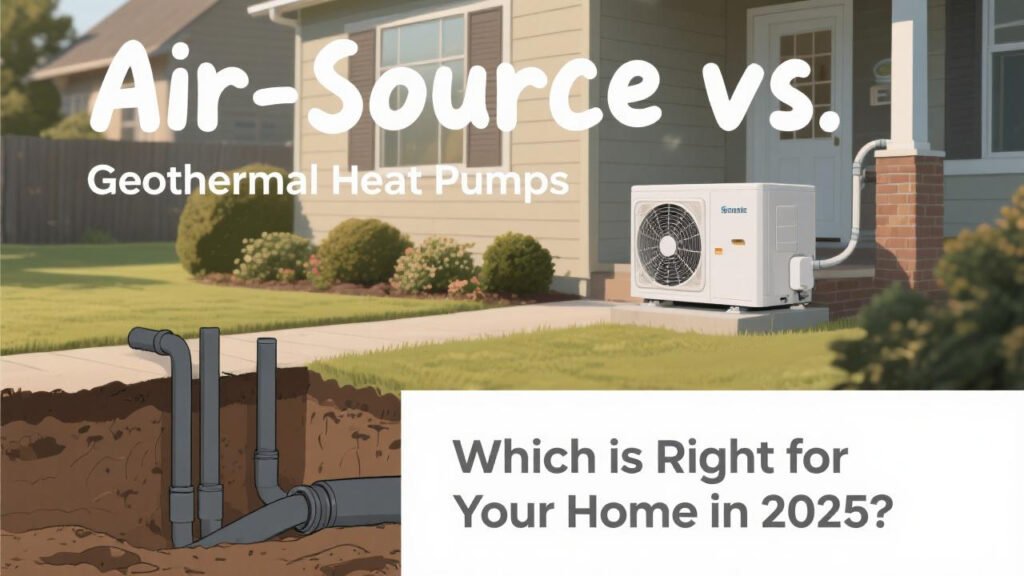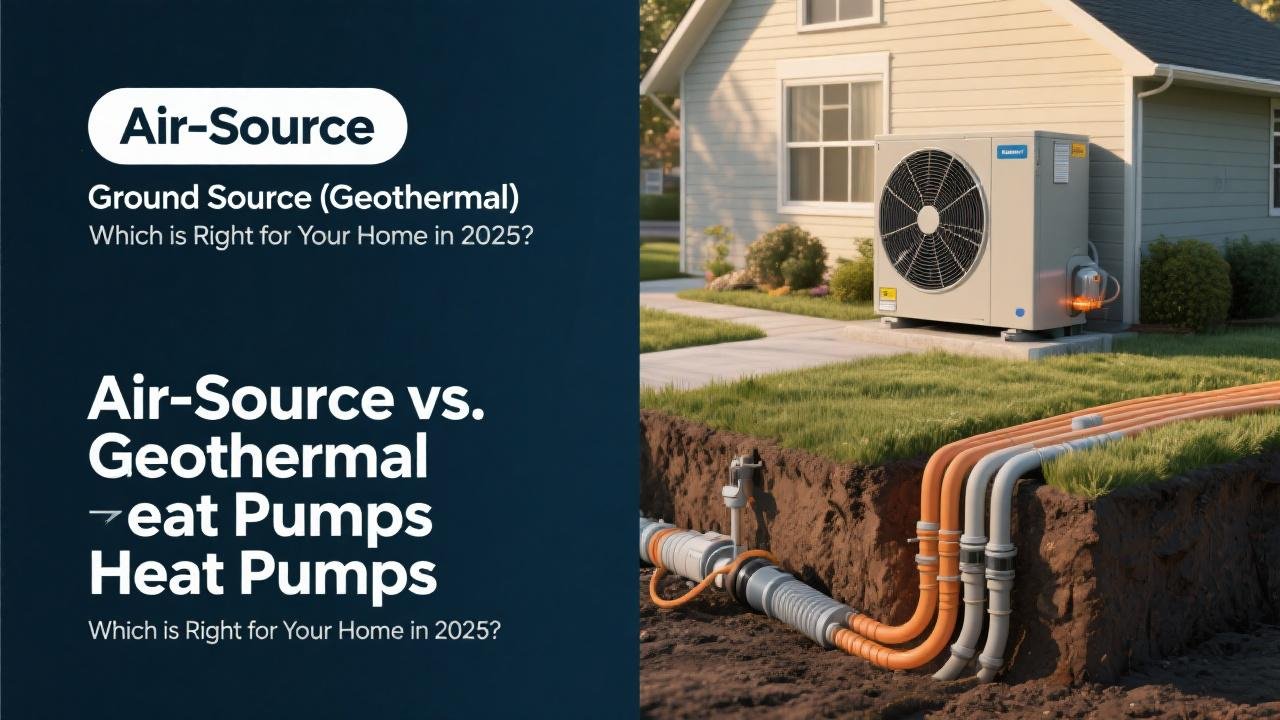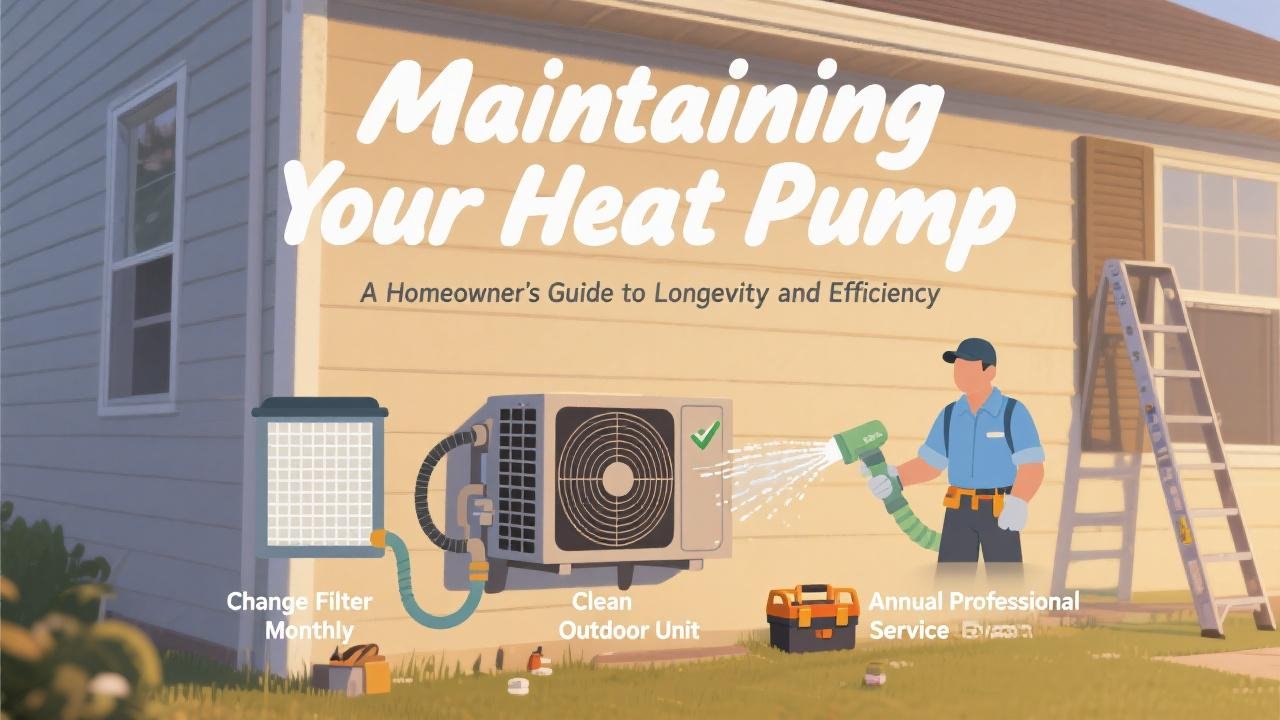Choosing Your Path to Ultimate Home Comfort and Efficiency
You’ve decided a heat pump is the way to go for your home’s heating and cooling needs – an excellent choice for energy savings and environmental responsibility in 2025! Now, you face another important decision: should you opt for an air-source heat pump (ASHP) or a geothermal (ground-source) heat pump (GSHP)? Both technologies operate on the principle of moving heat rather than generating it, but they draw that heat from different sources and have distinct installation requirements, costs, and performance characteristics.
This guide will provide a detailed comparison of air-source and geothermal heat pumps to help you determine which system might be the best fit for your home, budget, and priorities.
Air-Source Heat Pumps (ASHPs): The Popular and Versatile Choice
- How They Work: ASHPs extract heat from the ambient outdoor air during winter and expel heat to the outdoor air during summer. They are the most common type of heat pump due to their easier installation and lower upfront cost compared to geothermal systems.
- Types:
- Ducted (Central): Uses your home’s ductwork to distribute heated or cooled air.
- Ductless Mini-Splits: No ductwork needed; individual indoor units provide zoned comfort.
- Pros:
- Lower Upfront Cost: Generally less expensive to install than geothermal systems because no ground excavation is required.
- Versatile Installation: Suitable for most homes, including those with limited yard space. Mini-splits are great for retrofits or additions.
- Good Efficiency: Modern ASHPs, especially ENERGY STAR certified models, offer excellent energy efficiency (SEER2 ratings for cooling, HSPF2 for heating). Cold-climate models can perform effectively even in sub-freezing temperatures.
- Wide Availability of Installers and Equipment: Many HVAC contractors are familiar with ASHP installation and service.
- Cons:
- Efficiency Can Vary with Outdoor Temperature: While much improved, the efficiency and heating capacity of some ASHPs can decrease as outdoor temperatures drop to extreme lows. However, cold-climate heat pumps are specifically designed to mitigate this.
- Outdoor Unit Exposure: The outdoor unit is exposed to weather elements, which can affect longevity if not properly maintained.
- May Require Backup Heat in Very Cold Climates: In extremely cold regions, some homeowners opt for a dual-fuel system (ASHP paired with a gas furnace) or have electric resistance backup heat for the coldest days, though this is becoming less necessary with advanced cold-climate models.
Geothermal (Ground-Source) Heat Pumps (GSHPs): The Ultimate in Efficiency and Stability
- How They Work: GSHPs tap into the stable temperatures found underground (or in a nearby body of water). A series of pipes, called a ground loop, is buried in your yard. A fluid circulates through this loop, absorbing heat from the earth in winter and transferring it to your home, or dissipating heat from your home into the earth in summer.
- Types of Ground Loops:
- Horizontal Loops: Require more land area as pipes are laid in trenches a few feet deep.
- Vertical Loops: Boreholes are drilled deep into the ground; better for smaller lots but can be more expensive to install.
- Pond/Lake Loops: If you have a suitable body of water nearby, the loop can be submerged.
- Pros:
- Highest Energy Efficiency: GSHPs are the most efficient type of heat pump because ground temperatures remain relatively constant year-round (typically 45-75°F depending on latitude). This means they don’t have to work as hard as ASHPs when outdoor air temperatures are extreme.
- Consistent Performance: Their performance is not affected by outdoor air temperature fluctuations.
- Long Lifespan: The indoor heat pump components typically last 20-25 years, while the underground ground loop can last 50 years or more.
- Quiet Operation: The “outdoor” component (the ground loop) is buried, and the indoor unit is generally very quiet.
- Lower Operating Costs: Due to their high efficiency, GSHPs can result in the lowest long-term energy bills.
- Can Provide Hot Water: Some GSHPs can be equipped with a desuperheater to provide supplemental domestic hot water.
- Cons:
- Higher Upfront Cost: The primary drawback is the significantly higher installation cost, mainly due to the excavation or drilling required for the ground loop. This can make them 2-3 times more expensive to install than ASHPs.
- Installation Complexity and Space Requirements: Requires significant yard space for horizontal loops or specialized drilling equipment for vertical loops. Not all properties are suitable.
- Finding Qualified Installers: Fewer HVAC contractors specialize in geothermal installations compared to air-source systems.

Key Comparison Points for 2025:
| Feature | Air-Source Heat Pump (ASHP) | Geothermal Heat Pump (GSHP) |
|---|---|---|
| Primary Heat Source/Sink | Outdoor Air | Ground/Water Temperature |
| Upfront Installation Cost | Moderate | High to Very High |
| Operating Efficiency | Good to Excellent (SEER2/HSPF2) | Excellent to Outstanding (EER/COP) |
| Performance in Extreme Cold | Modern cold-climate models perform well; older/basic models may see reduced capacity | Consistent, unaffected by air temp |
| Lifespan (Indoor Unit) | 15-20 years | 20-25 years |
| Lifespan (Outdoor Component) | 15-20 years (outdoor unit) | 50+ years (ground loop) |
| Installation Space | Minimal (outdoor unit pad) | Significant yard space or drilling access |
| Maintenance | Regular filter changes, annual professional check-up | Regular filter changes, occasional loop/pump check |
| Federal Tax Credit (2025) | Up to $2,000 (Energy Efficient Home Improvement Credit for ENERGY STAR Most Efficient models) | 30% of total cost, no cap (Residential Clean Energy Credit for ENERGY STAR models) |
Making the Right Choice for Your Home:
- Consider an Air-Source Heat Pump if:
- Your budget for upfront costs is a primary concern.
- You have limited yard space.
- You live in a moderate climate (though cold-climate ASHPs are increasingly capable).
- You prefer a simpler installation process.
- Consider a Geothermal Heat Pump if:
- Long-term operating cost savings and maximum efficiency are your top priorities.
- You have adequate yard space and are prepared for the higher upfront investment.
- You plan to stay in your home for many years to recoup the initial cost.
- You want the quietest and most stable heating/cooling performance.
The significantly more generous federal tax credit for geothermal systems (30% with no cap vs. up to $2,000 for ASHPs) can help offset the higher initial cost of GSHPs, making them more financially competitive in the long run than they might first appear.
How EnergySage Can Assist:
While EnergySage primarily focuses on solar and related technologies, the principles of getting multiple quotes and expert advice apply to major home energy upgrades like heat pumps. For complex decisions like choosing between ASHP and GSHP, consulting with multiple HVAC professionals who specialize in these systems is crucial. They can perform detailed load calculations for your home, assess your property’s suitability, and provide accurate cost and savings projections.
Tailoring Your Heat Pump Solution
Both air-source and geothermal heat pumps offer substantial improvements in energy efficiency and comfort over traditional HVAC systems in 2025. ASHPs provide a versatile and more affordable entry point into heat pump technology, with modern units performing impressively even in colder conditions. GSHPs represent the pinnacle of efficiency and long-term savings, albeit with a higher initial investment.
Your choice will depend on your budget, property characteristics, climate, and long-term financial goals. Carefully weigh the pros and cons, research available incentives, and most importantly, consult with qualified HVAC professionals to determine the best heat pump solution for your unique home.
Article 3: Best Air Source Heat Pumps 2025: Top Brands for Efficiency & Savings
Directory: Heating & Cooling (HVAC) / Best Heat Pumps
Target Audience: Homeowners actively researching and comparing air-source heat pump brands and models.
User Intent: Commercial/Informational
Keywords: best air source heat pumps 2025, heat pump reviews, energy efficient HVAC, top heat pump brands, Carrier heat pump, Lennox heat pump, Trane heat pump, heat pump cost, SEER2 rating.
Introduction: Choosing the Heart of Your Home’s Comfort System
Upgrading your home’s heating and cooling system is a significant decision, and in 2025, air-source heat pumps (ASHPs) stand out as a leading choice for energy efficiency, year-round comfort, and environmental responsibility. With numerous brands and models on the market, each promising optimal performance and savings, selecting the best air-source heat pump for your home can feel overwhelming. This guide will review some of the top-rated heat pump brands of 2025, highlighting their key features, efficiency ratings, and what makes them stand out. Remember, consulting with qualified HVAC professionals, perhaps found through resources like EnergySage which helps connect users to energy solution providers, is crucial for selecting the perfect system for your specific needs.
What Makes a “Best” Air-Source Heat Pump in 2025?
When evaluating air-source heat pumps, several factors contribute to a model or brand being considered “the best”:
- Efficiency Ratings (SEER2, EER2, HSPF2):
- SEER2 (Seasonal Energy Efficiency Ratio 2): Measures cooling efficiency. A higher SEER2 means greater energy savings during summer. As of January 1, 2023, new heat pumps must have a minimum SEER2 of 14.3.
- EER2 (Energy Efficiency Ratio 2): Another cooling efficiency metric, often more indicative of performance at peak outdoor temperatures.
- HSPF2 (Heating Seasonal Performance Factor 2): Measures heating efficiency. A higher HSPF2 indicates better performance and savings in winter. The minimum HSPF2 is 7.5.
- ENERGY STAR Most Efficient: For maximum savings and eligibility for certain tax credits in 2025, look for models recognized as ENERGY STAR Most Efficient.
- Compressor Type: Variable-speed compressors are generally the most efficient and provide the most consistent comfort, adjusting their output to precisely match heating or cooling demands. Single-stage and two-stage compressors are also available, typically at lower price points.
- Cold Climate Performance: If you live in a colder region, look for heat pumps specifically designed for low-temperature performance. Modern cold-climate heat pumps can operate efficiently even in sub-zero Fahrenheit temperatures.
- Noise Levels (Decibels – dB): Quieter operation enhances home comfort. Look for models with lower decibel ratings.
- Warranty: A strong warranty (typically 10 years on parts, with some offering longer on compressors) indicates the manufacturer’s confidence in their product.
- Brand Reputation and Reliability: Established brands with a history of reliability and good customer service are often preferred.
- Features: Smart thermostat compatibility, advanced diagnostics, and durable construction are desirable features.
Top Air-Source Heat Pump Brands for 2025 (Based on Industry Reviews):
Here’s a look at some of the leading brands highlighted by sources like Modernize for their performance and features in 2025 :
1. Carrier Heat Pumps
* Best For: Reliable Performance
* Key Features: The Infinity series with Greenspeed Intelligence offers adaptive variable-speed technology for optimized performance and cost savings.
* Efficiency: High-efficiency models available, often ENERGY STAR certified. Specific SEER2/HSPF2 vary by model.
* Warranty: Typically a 10-year parts warranty when registered.
* Pros: Trusted national brand, wide range of options, excellent warranty.
* Cons: Premium models can be pricey, installation costs can be higher.
* Typical Cost Range (Installed): $3,000–$15,000
2. Lennox Heat Pumps
* Best For: Energy Efficiency
* Key Features: Models like the SL25XPV use precision technology and variable-capacity compressors for quiet and efficient operation.
* Efficiency: Known for high SEER2/HSPF2 ratings.
* Warranty: Up to 10 years on parts and compressor.
* Pros: Highly respected brand, very quiet operation, excellent efficiency.
* Cons: Parts can be expensive, potentially limited availability of certain models or installers.
* Typical Cost Range (Installed): $2,200–$14,000
3. Trane Heat Pumps
* Best For: Durable Construction
* Key Features: Premium models offer some of the highest SEER ratings and are known for robust build quality.
* Efficiency: High SEER2 ratings, capable of significant energy bill reduction.
* Warranty: Generally a 10-year parts warranty, some models may have longer compressor warranties.
* Pros: Significant utility bill savings, very quiet operation, durable.
* Cons: Higher upfront cost, service areas might be more limited for some dealers.
* Typical Cost Range (Installed): $5,400–$12,400
4. American Standard Heat Pumps
* Best For: Consistent Comfort
* Key Features: The AccuComfort™ Platinum series offers impressive SEER ratings (e.g., up to 20.5 SEER for the Platinum 20) and remarkably low noise levels.
* Efficiency: High SEER2 ratings available.
* Warranty: Solid 10-year warranty, often with a 12-year compressor warranty upon registration.
* Pros: Durable and trouble-free operation, very quiet, consistent comfort.
* Cons: Repairs can be costly if out of warranty, model range might be less extensive than some competitors.
* Typical Cost Range (Installed): $2,000–$11,000
5. Bryant Heat Pumps
* Best For: Versatile Options (Often good value)
* Key Features: Offers a range of models with commendable energy efficiency, often similar to Carrier (its parent company) but sometimes at a more budget-friendly price point.
* Efficiency: Good SEER2/HSPF2 ratings across their product lines.
* Warranty: Typically a 10-year parts warranty with registration.
* Pros: Easy maintenance, readily available parts, good expected lifespan.
* Cons: Installation quality can vary by dealer, fewer top-tier ultra-high efficiency options compared to some premium brands.
* Typical Cost Range (Installed): $1,725–$10,500
Other Notable Brands Mentioned by Modernize :
* Payne: Budget-friendly, many ENERGY STAR models.
* Armstrong Air: Offers single, dual, and variable-speed ENERGY STAR models.
* Rheem: Widespread availability, versatile options (though some noise complaints noted).
* Amana: Known for comprehensive warranties and features like ComfortBridge™ Technology.
* Heil: Affordable options with good durability.
Table: Quick Comparison of Top Heat Pump Brands 2025
| Brand | Best For | Avg. Installed Cost (Approx.) | Typical Warranty (Parts) | Key Highlight |
|---|---|---|---|---|
| Carrier | Reliable Performance | $3,000–$15,000 | 10 Years | Greenspeed Intelligence |
| Lennox | Energy Efficiency | $2,200–$14,000 | 10 Years | Precision Technology, Quiet |
| Trane | Durable Construction | $5,400–$12,400 | 10 Years | High SEER, Very Quiet |
| American Standard | Consistent Comfort | $2,000–$11,000 | 10 Years | AccuComfort, Low Noise |
| Bryant | Versatile Options | $1,725–$10,500 | 10 Years | Good Value, Reliable |
Cost ranges and specific features vary by model and installation factors. Data primarily from Modernize.
Don’t Forget Incentives!
When budgeting for a new heat pump in 2025, remember to factor in available financial incentives. The Energy Efficient Home Improvement Credit offers a federal tax credit of up to $2,000 per year for qualifying air-source heat pumps (must be ENERGY STAR Most Efficient certified). Additionally, many states and local utilities offer their own rebates, which can further reduce the upfront cost.
Choosing the Right Installer is Key
Even the best heat pump won’t perform optimally if it’s not sized and installed correctly.
* Get Multiple Quotes: Always obtain quotes from at least three qualified HVAC contractors.
* Check Credentials: Ensure they are licensed, insured, and have experience with heat pump installations, particularly the brand you are considering.
* Manual J Load Calculation: A reputable installer will perform a Manual J load calculation to determine the correct system size for your home, rather than just guessing based on square footage.
While EnergySage is primarily known for solar, their model of helping consumers compare complex energy upgrades from vetted professionals is valuable. For heat pumps, seeking out local, highly-rated HVAC contractors who offer multiple brands and can explain the pros and cons of each is essential.
Investing in Efficient Comfort
Selecting the best air-source heat pump for your home in 2025 involves careful consideration of efficiency ratings, brand reputation, features, warranty, and, critically, the quality of the installation. Brands like Carrier, Lennox, Trane, American Standard, and Bryant consistently receive high marks for their offerings. By doing your research, comparing multiple quotes, and taking advantage of available incentives, you can invest in an HVAC system that will provide efficient heating and cooling, significant energy savings, and enhanced home comfort for years to come.



